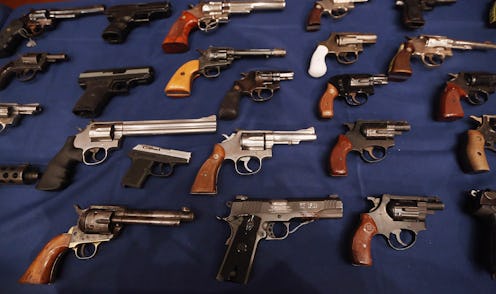News
Wyoming Mulls Bringing Back The Firing Squad
Major news for American capital punishment: Wyoming is considering bringing back the firing squad, a plan sure to stir impassioned reactions from supporters and opponents alike. No American citizen has been executed by firing squad since 2010, when Utah inmate Ronnie Lee Gardner was killed — despite such executions being banned in Utah in 2004, Gardner had insisted upon the method since the mid-90s, and his request was granted. It's currently mandated that lethal injection be Wyoming's primary means of killing inmates, but recently, dwindling supplies of such drugs across several death penalty states have caused some to turn to more archaic modes of execution.
It's by no means a phenomenon limited to Wyoming. In Tennessee, Republican governor Bill Haslem signed a bill Thursday allowing for the electric chair to be used, should lethal injections be unavailable. Legislators in the aforementioned Utah may also considering a return to the days of execution by gunfire — a Republican legislator, Rep. Paul Ray, has indicated he'll propose such legislation next January.
The impetus for all this legislative wrangling is disturbing. The national conversation on capital punishment reached fever pitch weeks ago, when an Oklahoma inmate, Clayton Lockett, was killed excruciatingly slowly during a botched lethal injection. Despite the state's Supreme Court ordering the execution delayed, Republican Gov. Mary Fallin had strong-armed the court into reversing itself, announcing she'd carry out the execution in spite of their stay.
The reason the usual drugs are in short supply is that their European manufacturers began refusing to tacitly take part in the practice of capital punishment, as they previously had been. SInce 2011, the European supply of the typical lethal drug cocktail has been unavailable to U.S. officials, causing them to turn to types of barbiturates traditionally used to kill animals. After the Danish manufacturer of those drugs stopped as well, the situation began to get thornier.
As it stands now, there's a very real argument to be had whether any of the way American states have at their disposal for executions could be considered humane, as opposed to "cruel and unusual." Methods like the electric chair and firing squad were originally done away with explicitly due to their potential for cruelty and agony. On the point of the electric chair, one need only look at the grisly case of Pedro Medina, executed in Florida in 1997.
By law currently on the Wyoming books, the secondary means of execution is supposed to be the gas chamber, but Wyoming doesn't actually have one, which spurred Haslam's move to approve the use of firing squads. Some states, to the contrary, are moving in the entirely opposite direction — back in February, Washington Governor Jay Inslee issued a moratorium on the death penalty, calling it "inconsistent and unequal."
One Wyoming Republican wants to follow suit. Rep. Stephen Watt of Rock Springs is a former highway patrolman who suffered gunshot wounds in a firefight prior to his political career. He's sponsoring a bill to halt the death penalty outright, both because of his religious views on the topic, but also his personal experience under fire.
"I've been shot," Watt said at a hearing. "And I don't care how quickly death comes from firing squad. It still hurts and it's still terrifying. And I think it's cruel and unusual."
